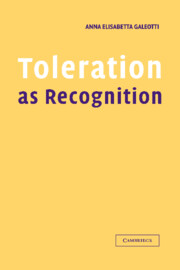Book contents
7 - Toleration and identity politics
Published online by Cambridge University Press: 22 September 2009
Summary
THE ARGUMENT FOR TOLERATION AS RECOGNITION
In this final chapter I want first of all to summarize the normative conception behind toleration as recognition, and then to consider some objections to it. The first and most common objection is that toleration as recognition is incompatible with liberal politics and a risk to the liberal order. Though the allegation of incompatibility is not incomprehensible in that public toleration of differences will lead to a redrawing of societal standards, and, consequently, worsen the majority's status, I argue that toleration as recognition is nevertheless compatible with liberal principles and does not infringe any right or fundamental value.
A second common objection concerns further claims for recognition, which are considered dangerous consequences of the public toleration of differences. Even though toleration as recognition can ultimately be made compatible with liberal politics, it opens the way to the arena of identity politics, whose tendencies towards particularism and tribalism are deeply at odds with liberal justice. In response, I will map out the key arguments in the politics of identity, sorting out the different claims and assessing whether adopting toleration as recognition commits the government to meeting further claims as well. Then I outline a general strategy for dealing with demands for recognition which suggests that from the perspective of social justice only some can be met, while others should be rejected and most can be negotiated.
- Type
- Chapter
- Information
- Toleration as Recognition , pp. 192 - 224Publisher: Cambridge University PressPrint publication year: 2002



